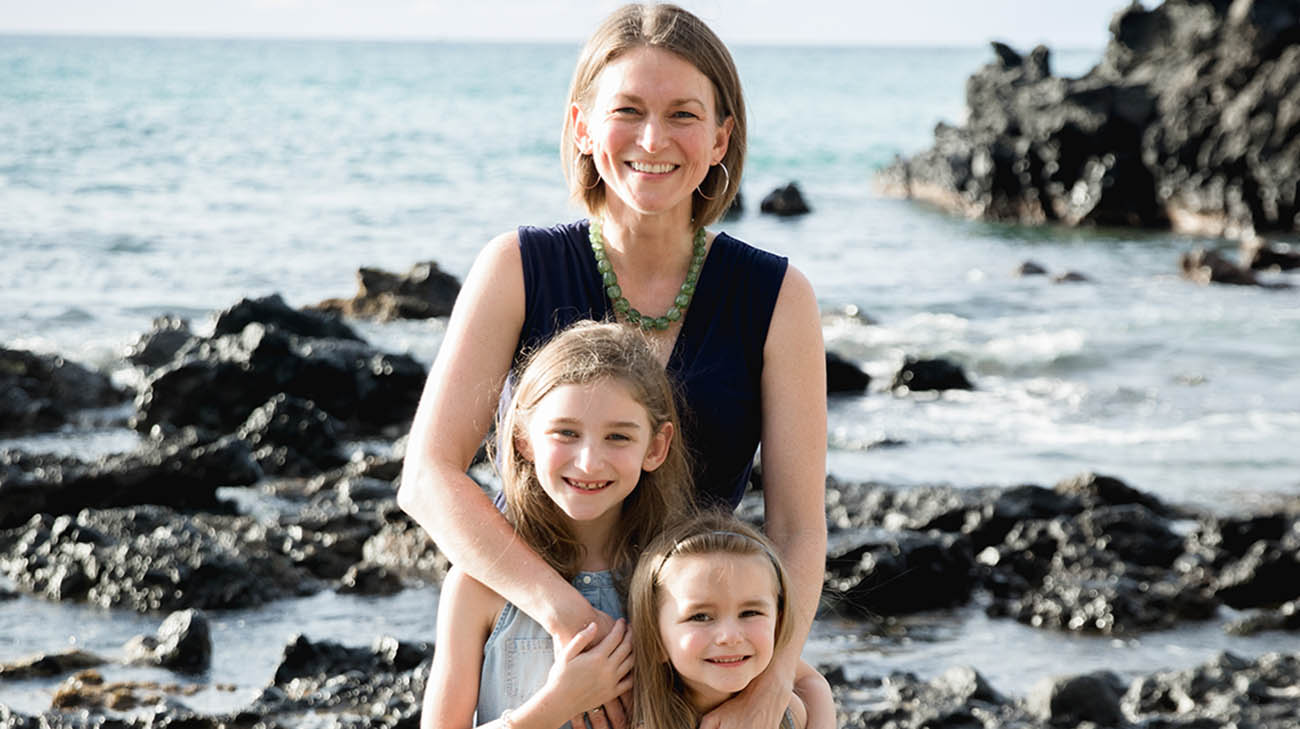
At age 35, before most women even begin to undergo screening mammograms, Kate Watson discovered she had stage 4 breast cancer. The disease had metastasized – spread to several other places in her body –including some lymph nodes in her chest, as well as cancerous spots in her spine, pelvis and one of her femurs.
“It was shocking. I remember thinking ‘This can’t possibly be happening,’” recalls Kate, whose two young daughters, Audrey and Olivia, were 4 and 2 years old, at the time. “I lead a relatively healthy lifestyle. I exercise. I’ve never smoked. I don’t have family history of breast cancer.”
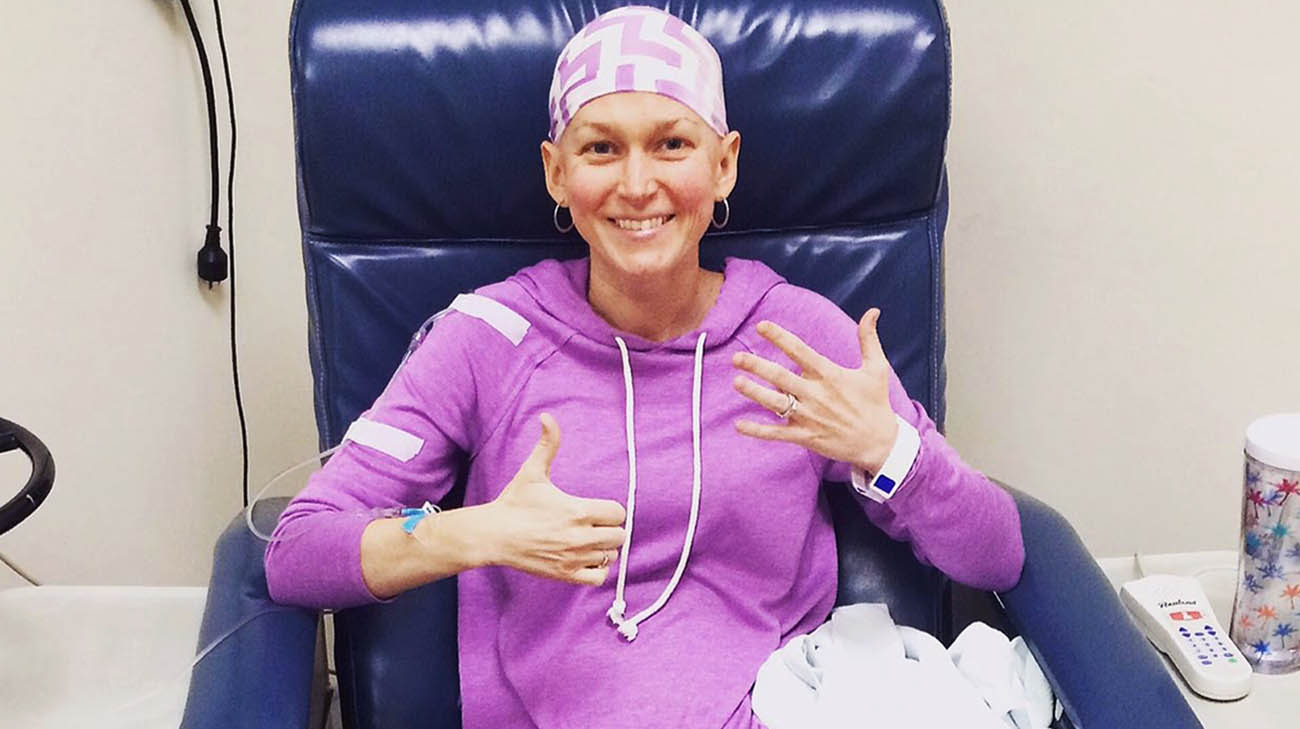
Kate, on the day she finished her sixth and final treatment with one of her chemotherapy drugs. Afterwards, she moved on to her current combination of medications, where she's experienced fewer side effects. (Courtesy: Kate Watson)
“How was I one of the one in eight women who develop breast cancer, and the 10 percent of those with stage 4 right off the bat?”
Years ago, a diagnosis of stage 4 metastatic breast cancer would almost assuredly have meant the patient wouldn’t survive. And indeed, breast cancer remains the second leading cause of death in women – and the leading cause for those ages 35 to 54.
Kate has been in remission for about three years and shows no signs of cancer in her body.
“I like to joke that I’m the healthiest stage 4 breast cancer patient you’ll probably ever come across,” says Kate, a Rocky River, Ohio, resident who continues to receive regular treatment, with a combination of “maintenance” drugs, through an IV port in her chest each month.
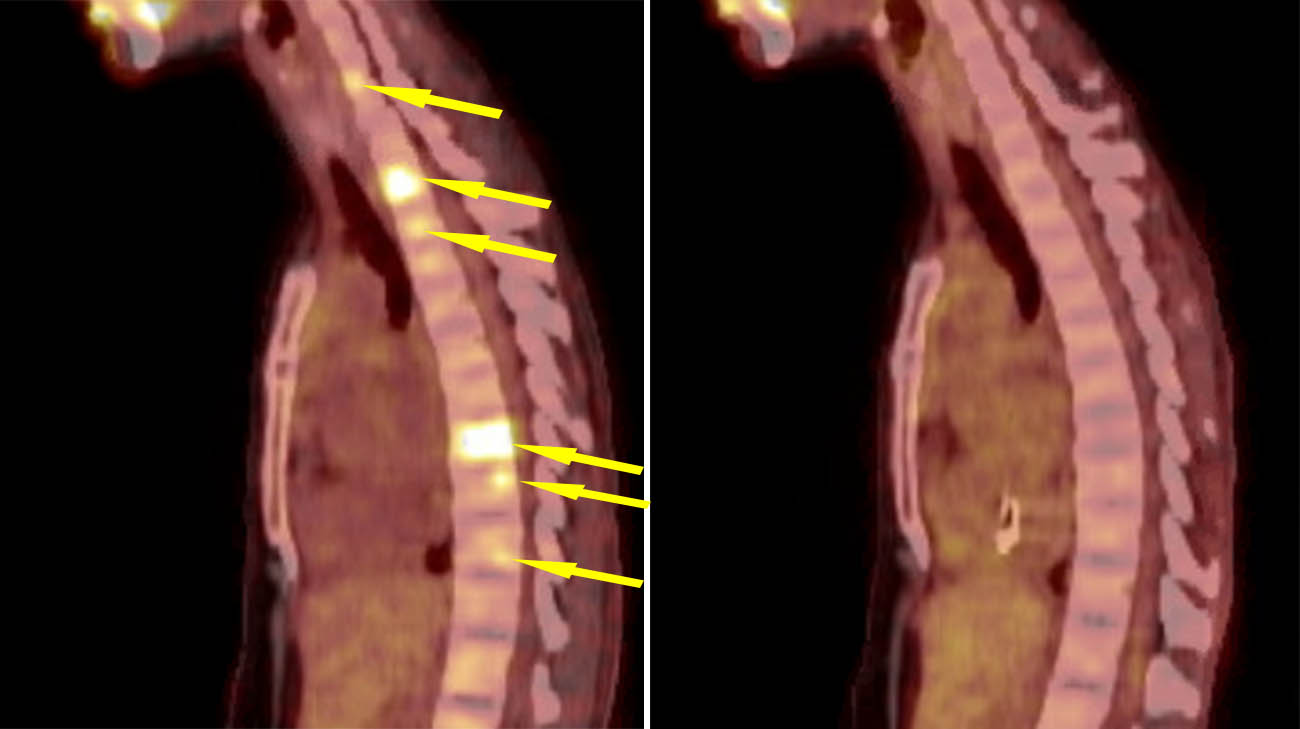
PET scans of Kate's spine. (Left) Cancer that spread from her breasts to her spine --found at the time of diagnosis. (Right) Kate's body currently shows no evidence of cancer, while she continues receiving infusion treatment every 21 days. (Courtesy: Cleveland Clinic)
While her diagnosis may have sounded grim, the particular form of the disease that was riddling her body – human epidermal growth factor receptor 2 (HER2) positive metastatic breast cancer – can often respond well to a particular concoction of chemotherapy drugs.
According to Kate’s oncologist, Jame Abraham, MD, clinical studies at Cleveland Clinic Cancer Center and elsewhere have shown the efficacy of slowing the progression of the disease. In particular, the emergence of HER2-targeted therapy, including the monoclonal antibodies trastuzumab (Herceptin) and pertuzumab (Perjeta) used to treat Kate (along with other medicines), has greatly improved survival in HER2+ breast cancer patients.
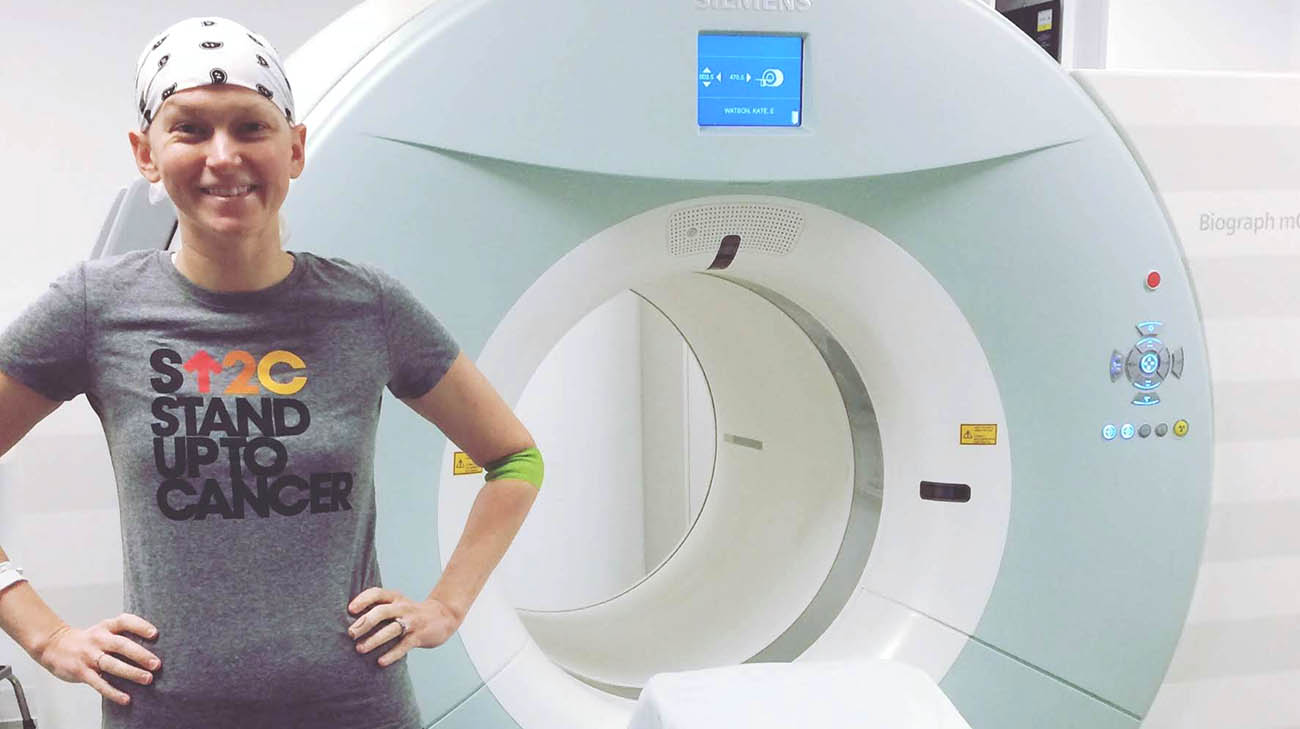
Kate prior to getting a PET scan. It's useful in evaluating Kate's cancer and treatment progress. (Courtesy: Kate Watson)
“Some patients can get complete response and remission and fortunately Kate is in that group,” explains Dr. Abraham, Chairman of the Cleveland Clinic Department of Hematology/Oncology.
Kate’s cancer was discovered by happenstance. Pregnant at the time, a routine prenatal genetic test uncovered the likelihood she had breast cancer. Sadly, Kate miscarried soon after. Further scans and a biopsy revealed the complete scope of the situation.Immediately after being diagnosed, Kate underwent intensive cycles of chemotherapy treatment for three months. She did not undergo surgery. Ever since, reports from regular positron emission tomography (PET) scans have revealed the official description of her condition: “no evidence of active disease.”

Kate with Dr. Abraham at a community fundraising initiative to support cancer research. (Courtesy: Kate Watson)
“Dr. Abraham is an angel on earth,” says Kate. “I remember him grabbing my hands and saying, ‘We are going to take care of you.’ It really does take a team.”
Well aware that medical research contributed to her lifesaving treatment, Kate has been a strong advocate for raising awareness of and funds for metastatic stage 4 breast cancer research and treatment. With the support of her husband, Scott, and an army of family and friends, Kate has organized events that have raised more than $35,000 for research. She and her family also participate in VeloSano, an annual Cleveland Clinic bike ride and fundraiser that supports cancer research.
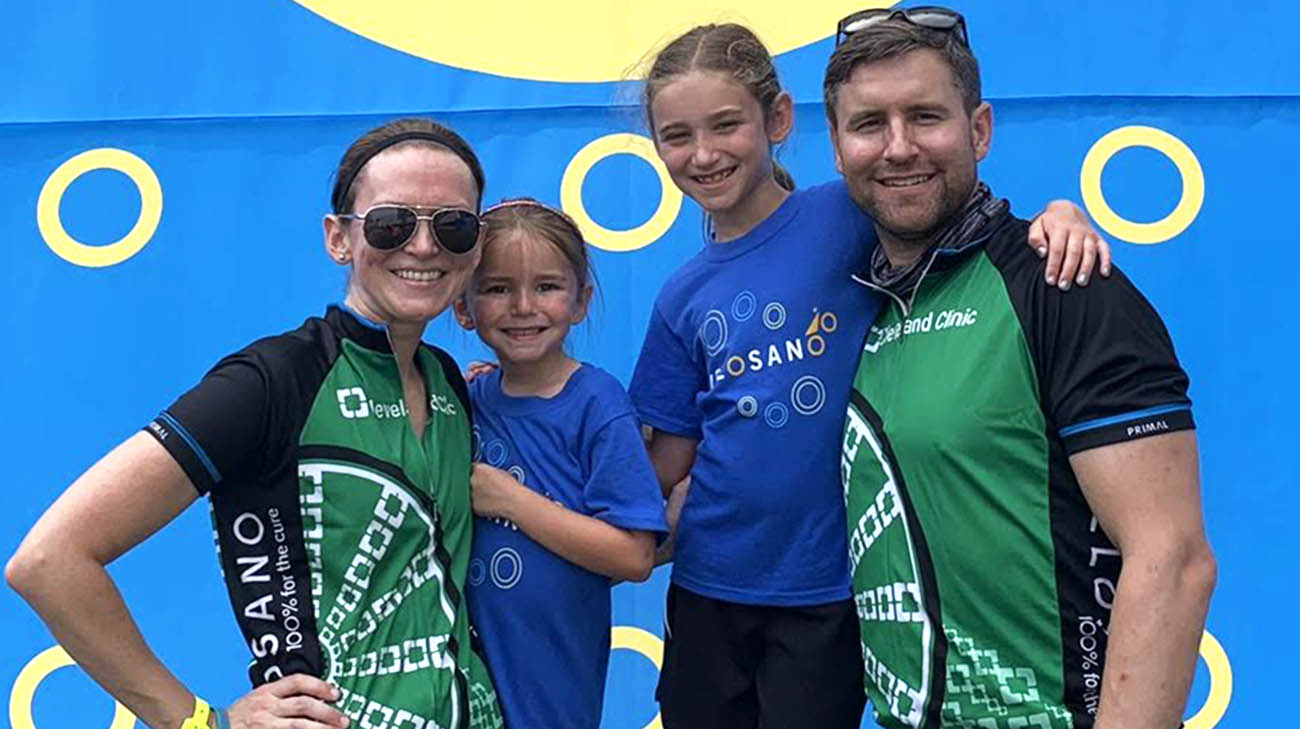
Kate, her daughters, Audrey and Olivia, and her husband, Scott, at VeloSano --a fundraiser to support cancer research at Cleveland Clinic. (Courtesy: Kate Watson)
She has lobbied for funding from Congress, and is an active participant in the Cleveland-area peer-to-peer chapter of METAvivor, a national network and support group for individuals with metastatic breast cancer. While these efforts have raised both funds and hope, the painful realities of cancer remain front and center for Kate. Two women who encouraged her to join METAvivor have since passed away.
“I’m a walking testament to the fact that, through research, we can find a treatment for everybody with metastatic breast cancer,” Kate implores. “That’s why I have become so vocal. Without these drugs, I wouldn’t have survived this type of cancer.”

Kate helping kickoff METAvivor's 2019 Stage 4 Stampede event, in Washington D.C. --advocating for advancing metastatic cancer research. (Courtesy: Kate Watson)
Dr. Abraham encourages anyone diagnosed with breast cancer to seek out the best and most aggressive treatment available – even with a stage 4 diagnosis.
“One of the reasons people delay treatment is because they think a diagnosis of cancer is a death sentence,” he explains. “But even for advanced breast cancer, there are many treatment options that have been successful, as Kate has shown. One must never lose hope.”Related Institutes: Cleveland Clinic Cancer Center


